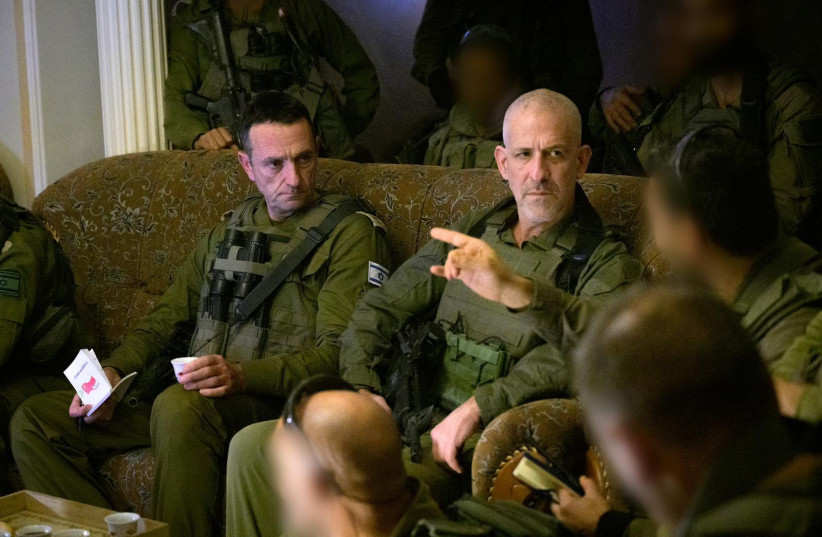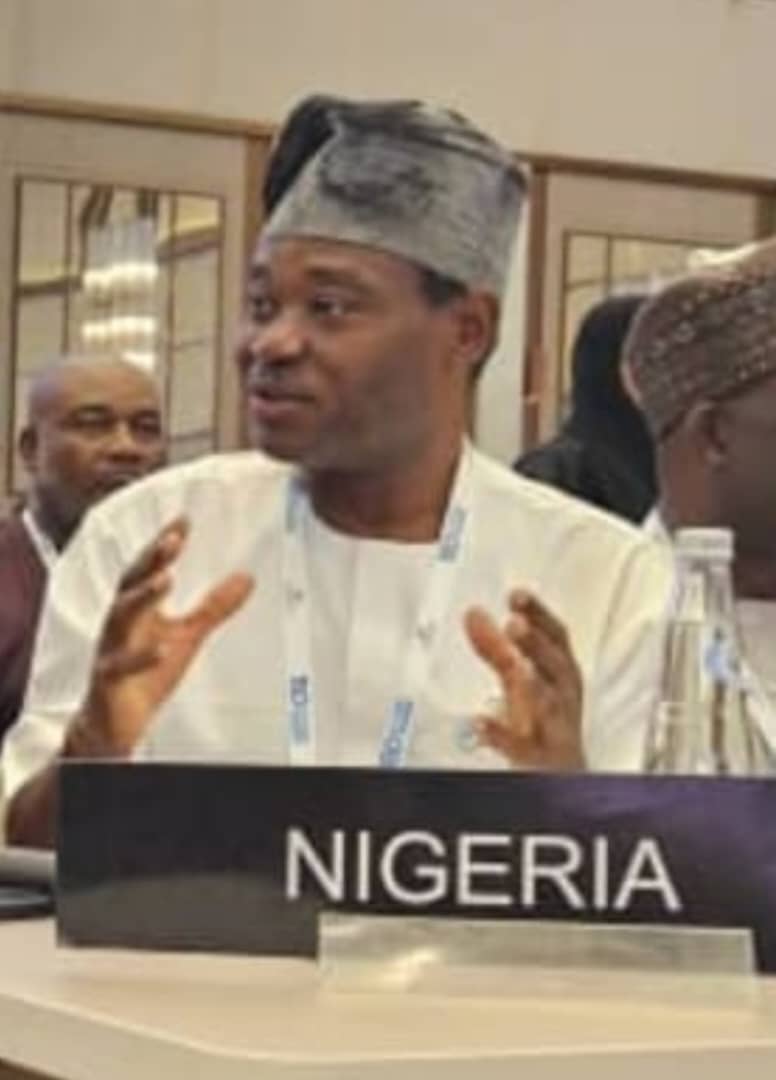Security
IDF, Shin Bet chiefs meet in Khan Yunis

Rockets pound center as IDF invasion death toll passes 100.

IDF Chief-of-Staff Lt.-Gen. Herzi Halevi and Shin Bet (Israel Security Agency) Chief Ronen Bar met in Hamas’s southern Gaza capital of Khan Yunis on Monday night to demonstrate IDF progress.

Halevi said, “we are deepening our gains in northern Gaza, the South, and underground.”
Bar stated, “There is no force which can stand up to the combined force” of the IDF soldiers and the Shin Bet combat forces.
In a meeting in Khan Yunis with the two chiefs, IDF Southern Commander Maj.-Gen. Yaron Finkleman, the Division 98 Commander and the IDF Commandos chief all provided the latest updates on Israeli forces in the South, now eight days into the southern operation.
In addition, the IDF said that more than 500 Palestinians have been arrested over the last four weeks and have been taken to be interrogated by the Shin Bet and IDF intelligence Unit 504.
Among them are 350 from Hamas, and 120 from Islamic Jihad.
“Making progress in battle”
At a Monday night press conference, Defense Minister Yoav Gallant said, “we are making progress in battle and deepening our achievements.”
Gallant spoke directly to Hamas Chief Yahya Sinwar, telling him either to surrender or face death on the battlefield.
He said that Hamas terrorists in Jabalya and Shejaia are being brought down, even though they had thought they were unbeatable. “They are on the verge of falling apart,” he said.
Next, he said that Hamas forces who surrender are saying they do not have enough ammunition or food.
Gallant noted that many of those surrendering were involved in the October 7 massacre.
Questioned about a security zone around Gaza, Gallant responded that anything which serves the military campaign is something Israel needs to do, and that the fighting will not be short. On the flip side, the defense minister said, “there is no intent to stay permanently in the Gaza Strip.”
Further, he added that IDF commanders are taking big risks in a variety of strategic directions to save the lives of Israeli hostages being held by Hamas.
Pressed as to whether the US is setting a deadline for Israeli operations, he replied, “The war will end when its goals are achieved… I take with seriousness what America does… and we will find a way to help the US to help us.”
IDF death toll passes 100
Despite Israel’s ongoing albeit slow progress, Hamas managed to fire a barrage of rockets on Tel Aviv and the country’s center as the IDF announced on Monday that its death toll of fallen soldiers since the invasion had crossed the 100 mark, reaching 103.
Although rockets fired from Gaza at Israel, and especially at Tel Aviv and other central areas, have dropped dramatically to around 40 sirens per day as compared to the start of the war, the Gaza terror group has maintained its capability to reach sensitive parts of the country.
Three soldiers – IDF Maj. (res.) Roman Bronshtein, 46, Cpt. (res.) Eliya Yanovsky, 24, and Master-Sgt. Ari Yehiel Zenilman, 32 – fell in battle in the southern Gaza Strip on Sunday, the IDF Spokesperson’s Unit said Monday afternoon.
The IDF had already announced the names of four more fallen soldiers on Monday morning.
One of them, Warrant Officer (Res.) Gideon Ilani, 35, of Asael, fought in the 2855th Battalion. Ilani was killed in battle in Gaza.
Two soldiers fell fighting in the 8111th Battalion in southern Gaza: Warrant Officer (Res.) Etay Perry, 36, from Modi’in; and Major (Res.) Eviatar Cohen, 42, from Kfar Saba.
Lastly, Major (Res.) Gal Becher, 34, of Oranit, an instructional officer in the 36th Brigade, was killed in a military road accident in southern Israel.
Some of the soldiers died in an ambush near a tunnel in southern Gaza.
They were killed after IDF forces thought they had cleared the area of Hamas, but it appears that a lookout from another area may have remotely detonated an improvised explosive.
Meanwhile, a Hezbollah MP warned that Israeli airstrikes that caused widespread damage in the town of Aitaroun near the Israeli-Lebanese border on Sunday were a “new escalation,” adding that the terrorist group would continue its attacks on Israel, in a statement to Reuters.
Hassan Fadlallah warned that the terrorist movement would respond to the “escalation” in new ways, be it “in the nature of the weapons [used] or the targeted sites.”
Lebanese media portrayed the IDF’s response to Hezbollah attacks on Sunday as a significant escalation compared to other clashes along the border in recent weeks.
On Monday morning, at least six rockets were fired from Lebanon toward northern Israel and were intercepted by the Iron Dome, according to the IDF Spokesperson’s Unit. The military responded with artillery fire and multiple rounds of airstrikes targeting several locations along the Lebanese border.
Additionally on Monday, Lebanon’s Nidaa al-Watan newspaper reported that a gradual escalation had been taking place in recent days, coinciding with a demand by Israel that Hezbollah withdraw to north of the Litani River in Lebanon in accordance with UN Security Council Resolution 1701.
The Nidaa al-Watan report noted that the strike on Aitaroun was the first in which “an entire neighborhood has been destroyed in a southern town,” saying that this raised concerns that “the Gaza war model of widespread destruction… is beginning to rear its head on the Lebanese front.”
IDF sources confirmed that the military has somewhat escalated its attacks and responses in the North.
Gallant said at his press conference that either there needs to be a deal with Hezbollah to move its Radwan and anti-tank missile forces back from the border, or there will be a need for a military operation to move them back.
He added that Hezbollah has lost far more than 100 members of its forces, given that it coordinates with other terror groups and is excluding losses of those terror groups from its public numbers.
Questioned as to whether the IDF had used white phosphorus in battle in Lebanon, he responded vaguely, “we follow international law.”
Hezbollah announced on Monday morning that two of the movement’s members were killed amid the intensifying clashes.
Last week, Gallant told the leaders of communities near the northern border what he said at his press conference: that Israel was attempting to reach a diplomatic solution in which Hezbollah would retreat to the Litani River, but was also prepared to remove the terrorist group through military means from the area near the border.
During a visit to Israeli forces along the Lebanese border on Sunday, Halevi stressed that security needs to be restored to the northern front, and that “there is a military way to do this, the beginning of which is also what you are doing here—to strike, to deter, to kill Hezbollah operatives, to show our superiority—and it can also come in the form of an offensive, an attack and a war.
“The State of Israel has never gone and said war is the first solution we will try,” he said, “but we understand that the current situation should end with a very, very clear change.”
Ali Damush, the deputy chairman of Hezbollah’s Executive Council, rejected statements by Israeli officials saying that the group “will not allow the equations to be changed,” with some reports saying that the terrorist group would not withdraw its forces any sooner than the IDF would move its forces back to Haifa.
On Sunday, the United Nations Interim Force in Lebanon said that a watchtower inside a UNIFIL position near Ibel Qameh in the country’s southern region was hit by shelling on Saturday afternoon. No injuries were reported in the incident.
“Any targeting of UNIFIL positions and any use of the vicinity of our positions to launch attacks across the Blue Line is unacceptable,” the interim force said. “After over two months of active shelling along the Blue Line, the potential for a miscalculation that could trigger a wider conflict is increasing.”

Security
Senator Jimoh urges global parliamentary body to support Defence budgets to tackle insecurity across globe

Jimoh stated this during the 150th inter-parliamentary meeting in Uzbekistan

Senator Jimoh Ibrahim representing Nigeria and other modern war studies experts have urged the global parliamentarians to support Ministries of Defence annual budget to curb insecurity across the world.

He stressed that the body should collaborate and support budgets rather than investigation as insecurity is likely to escalate in the 21st century.
He emphasised the need for a supportive rather than an investigative approach, asserting that human life is priceless.
According to him: “The central question for governments and security agencies should be: security for whom, when, and how?
“Addressing power and insecurity issues alongside their ecosystems is key to the security of the geocentric system.
“The government’s failure to address poverty effectively will further exacerbate insecurity.”
Senator Ibrahim noted that the government’s approach to security is marked by a constant flip between fear and courage: fear that the system is failing.
“Life is increasingly tricky amid this struggle, yet we still maintain a defence structure. It is only a matter of time before one of these emotions- fear or courage- prevails.
“I saw fear within government leadership, leading to unprecedented crises and heightened insecurity,” he said.
The Senator responded to inquiries from the international media in Uzbekistan and emphasised that parliament needs to adopt a more supportive and friendly stance rather than merely fulfilling its traditional oversight duties regarding the Ministry of Defence appropriations.
The Nigerian Senator observed “a noticeable shift in the relationship between the goals of poverty reduction and governmental efficiency, is the area where domestic insecurity arises”.
Senator Ibrahim, who holds a doctorate in Modern Warfare, remarked that when Parliament functions as an oversight entity examining security expenditures, it might inadvertently foster insecurity.
He stressed that efficient system and process creation and management could assist in fighting fraud related to security spending, a key concern for Parliament.

Security
DEPOWA College Project: A commitment to nation building – Badaru

The Minister of Defence, Mohammed Badaru Abubakar has underscored that the proposed Defence and Police Officers’ Wives Association (DEPOWA) College Project signifies a steadfast commitment of military and police families to nation-building.

The Minister made the statement during the ground-breaking and fundraising ceremony held in Abuja, where he commended DEPOWA for its visionary leadership in advancing this significant initiative.

In his address, Minister Badaru described the event as a historic milestone: “It is with great pride and enthusiasm that I join you today to celebrate this momentous occasion—the ground-breaking and fundraising for the DEPOWA College Project.
This initiative embodies the unwavering commitment of our military and police families to nation-building, and I commend DEPOWA for its visionary leadership in championing this noble cause.”
Highlighting the importance of education, the Minister stated, “Education is the bedrock of societal progress.
This college will serve as a beacon of hope, excellence, and opportunity for the children of our brave service members. By investing in their future, we honor the sacrifices of their parents and strengthen the foundation of our national security.
A well-educated generation nurtured in an environment of discipline and patriotism is critical to sustaining peace, unity, and prosperity in Nigeria.”
Minister Badaru reaffirmed the Ministry’s commitment to supporting DEPOWA, stating, “The Ministry of Defence stands in solidarity with DEPOWA and pledges its full support to ensure the timely completion of this project.
“We recognize the unique challenges faced by the families of those who dedicate their lives to protecting our nation. This college will alleviate educational burdens while fostering academic excellence and moral integrity among students.
“I also urge all stakeholders—government agencies, corporate organizations, and public-spirited individuals—to contribute generously to this laudable endeavor.”
In closing, he acknowledged and applauded DEPOWA for its resilience and compassion: “To our donors and partners, your generosity will resonate through generations. Together, we shall build an institution that will produce future leaders, innovators, and patriots. I wish you a successful event.”

Security
Islamic terrorist commander intercepted, arrested with weapons, cash in neigbouring Niger Republic

A Commander of a notorious Islamic Sect terrorist organization, Jama’at Nasr al-Islam wal Muslimin (JNIM) in the Tillabéri region has been arrested bybthe Nigerien Military.

He was arrested with cache arms and cash meant for terrorism operations, according to a popular Security analyst Zagazola Makama.

Reports indicated that cash, weapons, and logistical supplies believed to be intended for terrorist activities were recovered from the sect’s commander.
In its operational report for the period from April 3 to April 5, the army confirmed that the suspect was intercepted on April 3 at approximately 6:30 p.m. while traveling in a vehicle on the Torodi–Niamey route.
Military sources indicate that a search of the vehicle resulted in the recovery of a firearm, multiple mobile phones, and a total of 5,032,900 CFA francs. The army suspects that these funds were earmarked for acquiring logistics to facilitate terrorist operations.
Further investigations led the troops to a garden owned by the suspect in the village of Boborgou, which was reportedly utilized as a logistical hub by armed groups. Among the items found were food supplies, communication airtime, clothing, and black fabric believed to be used for camouflage purposes.
Additionally, security forces discovered a substantial stock of pasta in a nearby school building, which is thought to have been intended to support active terrorist operatives in the region.
The army has also indicated that the suspect is closely associated with the hijacking of two vehicles that occurred between Makalondi and Niaktiré on April 2.
Ongoing security operations in the area are part of a larger initiative aimed at dismantling terrorist networks and restoring stability.

-

 News4 days ago
News4 days agoSenators Natasha, Abbo unite in peddling dangerous falsehood against me – Akpabio
-

 News2 days ago
News2 days agoEchocho provides food items, cash to victims of windstorm in Kogi East
-

 Politics4 days ago
Politics4 days agoAbure’s Supreme Court Sack: Peter Obi, Nenadi Usman, LP faction react
-

 News1 week ago
News1 week agoKogi government bans rallies ahead of Natasha’s homecoming slated for Tuesday
-

 News2 days ago
News2 days agoAt 76, Governor Ododo extols Ibrahim Idris’ statesmanship, service to Kogi
-

 News1 week ago
News1 week agoIran may secure a deal before Trump’s deadline – or face Israeli strikes in Tehran – analysis
-
News1 week ago
Jungle Justice and the collapse of Law in Nigeria
-

 Energy and Power4 days ago
Energy and Power4 days agoMinister of Power signs performance contract with agencies





















